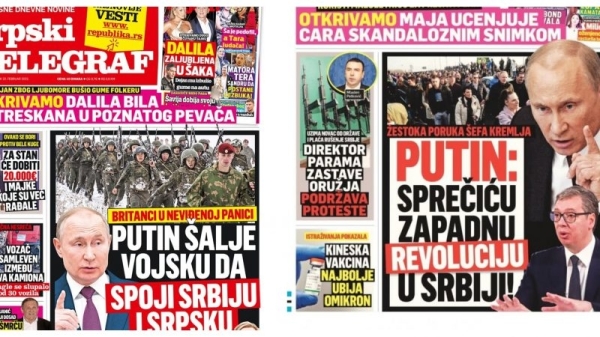Russian disinformation in the Balkans: Predating the invasion?

Russia’s successful infiltration of media in the Balkans predates a possible invasion, thanks to a network of Kremlin-aligned businesspeople, politicians, and influence agents who shape editorial policies and amplify disinformation campaigns, write Goran Georgiev and Ruslan Stefanov.
Russia’s aggression against Ukraine has been met with unanimous condemnation from the democratic West, but the battle for hearts and minds is far from over.
The Kremlin has already managed to hurt Europe’s image in Africa, relying on modest yet potent resources – the Wagner military mercenaries and sharp power, based on disinformation and cognitive bias against Europe’s colonial past on the continent.
The more Russia loses on the field in Ukraine and beyond, the more it would seek to deploy this judo tactic of using the opponents’ economic or cognitive weight against them.
In fact, disinformation campaigns tend to benefit from the passage of time, as people are more likely to believe information that they have been exposed to repeatedly, a phenomenon is known as the illusory truth effect.
As the invasion drags on, the shock and outrage that initially galvanised public opinion is waning while Russian disinformation continues to intensify and spread. This is particularly true in the Balkans, where Russia maintains considerable political, economic, and cognitive influence.
Despite a drop in public support for Russia following the invasion’s onset, pro-Kremlin political parties and media outlets continue to wield significant power in the region, perpetuating disinformation and propaganda narratives.
Political instability in the region spiked in the months after the start of the full-scale invasion. Moldova’s pro-Western government collapsed. Amidst five parliamentary elections in less than 24 months, Bulgaria failed to make its next steps toward EU integration, remaining outside the Schengen area and the Eurozone. Montenegro has teetered on the brink of constitutionality. Bosnia and Herzegovina has remained institutionally dysfunctional, while Serbia and Kosovo stay at loggerheads.
And all this despite the very honest, considerable, and continuous efforts on the side of the European Commission to bring the region closer to the EU.
Russia’s successful media infiltration in the region predates the invasion, thanks to a network of Kremlin-aligned businesspeople, politicians, and influence agents who shape editorial policies and amplify disinformation campaigns.
Russian embassies in the region have taken to social media to disinform and engage hesitant publics, with a particular focus on countries with which the Kremlin holds particular cognitive sway and which are geopolitically important such as the EU and NATO member Bulgaria, and new NATO members, North Macedonia, and Montenegro.
Meanwhile, traditional media outlets are struggling to stay afloat, relying on Russian state-controlled sources like RT, Sputnik, and TASS for affordable content.
Social surveys conducted throughout Southeast Europe marked a noticeable decrease in public support for Russia at the beginning of the invasion. However, key pro-Kremlin outlets and parties’ editorial policies and political programs have endured.
Parties sympathetic to Moscow, such as the SNS and the SPS in Serbia, Revival and the BSP in Bulgaria, and the SNSD in Bosnia, retained their parliamentary positions throughout the general elections in 2022/2023. Combined with a media space awash with disinformation, their influence has contributed to a partial rebound of public sympathies toward Russia following the initial upset of the invasion.
Russia had already successfully capitalised on lax regulations to exert influence on media content in the region through opaque local networks of influence and illicit capital flows in the years before the invasion. These networks consist of Kremlin-aligned business tycoons, politicians and influence agents who direct the editorial policies of major outlets and give credence to disinformation narratives. They have ensured the upkeep of a mainstream information environment conducive to the Kremlin’s disinformation campaigns, which have only intensified after the launch of its invasion of Ukraine.
The current moment of political and public backlash against Russia’s aggression is a fleeting opportunity for transatlantic cooperation to counter disinformation and reinforce democratic values in Southeast Europe. This requires institutional measures to roll back media capture and support independent journalism and digital diagnostic tools to investigate disinformation and its impact in near real-time. Building trust in democratic institutions and raising public awareness are crucial steps in this effort.
The fight against disinformation is a marathon, not a sprint, and securing cognitive superiority is essential for winning the war outside Ukraine. The US and EU must act swiftly and decisively to support their Balkan partners in this critical endeavor. They have already done a loendeavourt to put the region on the path to democracy. Yet, massive disinformation flows continue to poison the well and require a whole of society and government approach to make sure democracy delivers.



